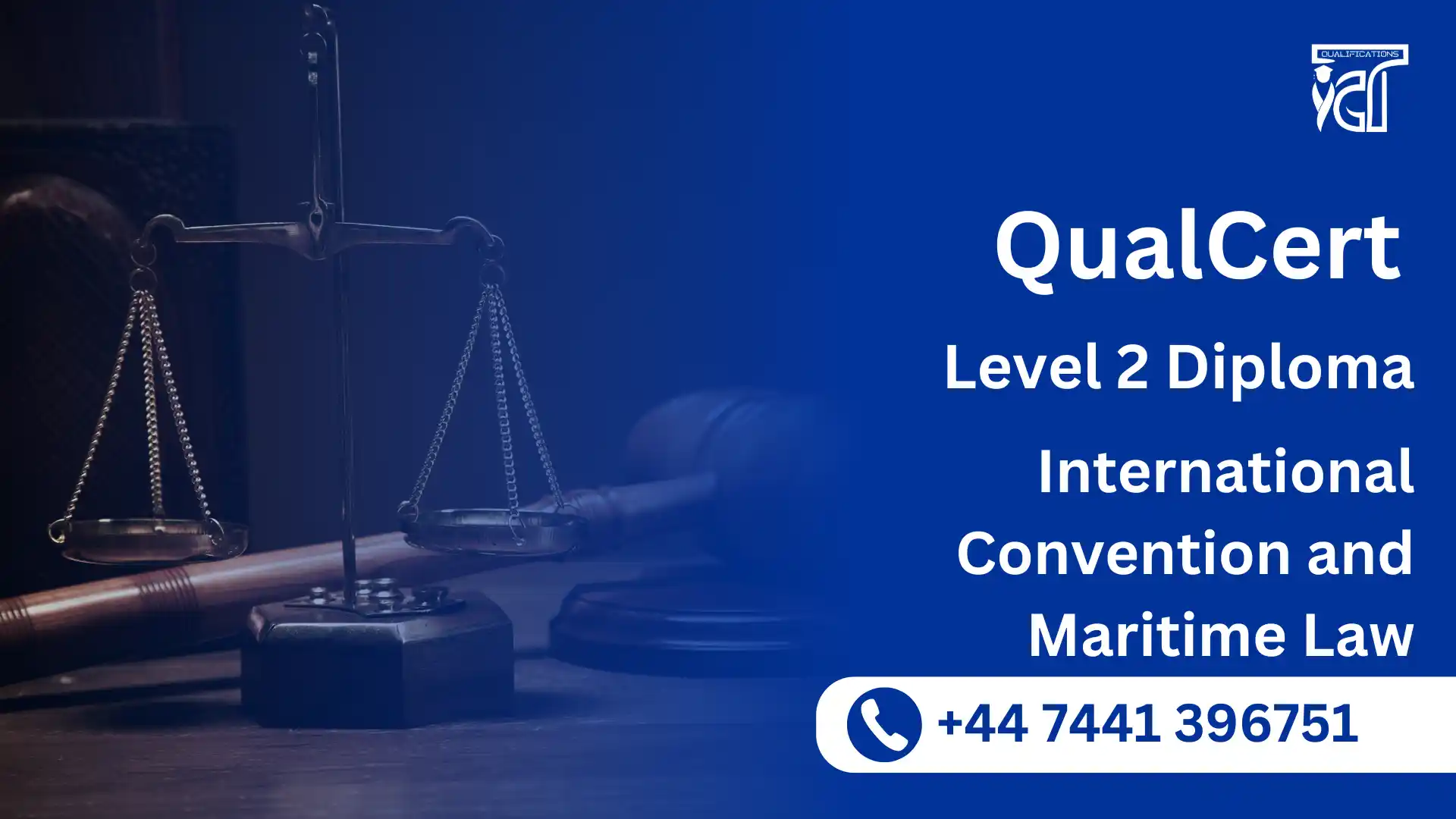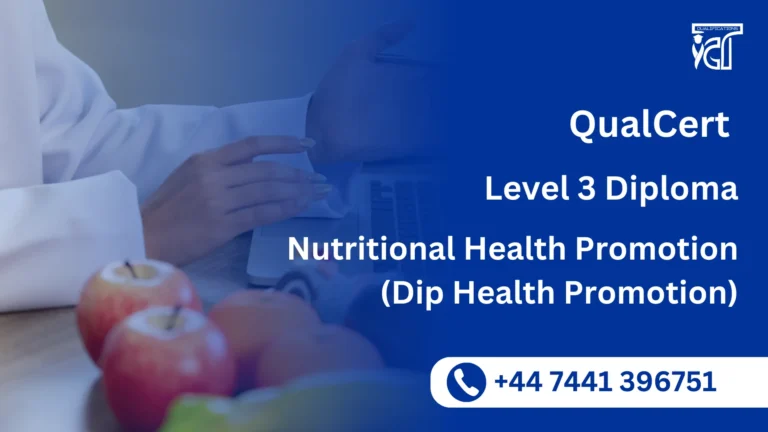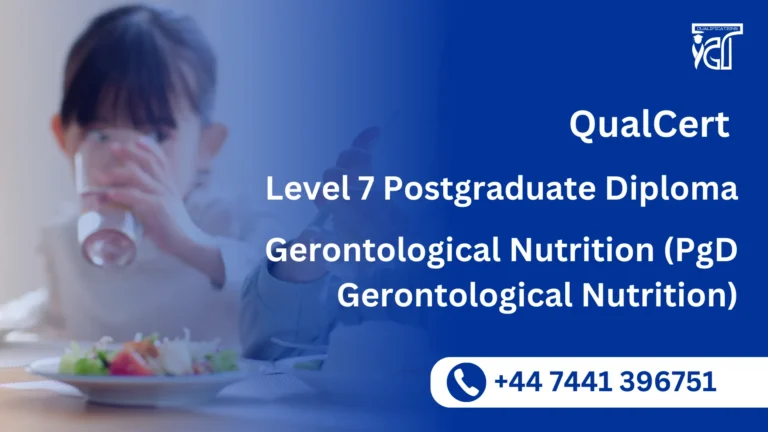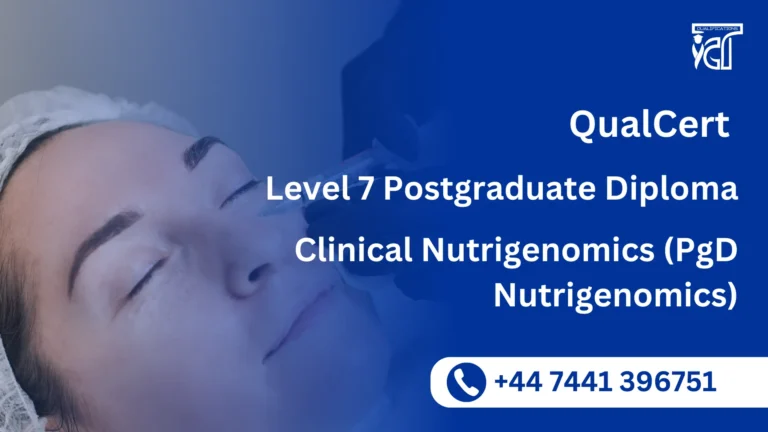The QualCert Level 2 Diploma in International Convention and Maritime Law is a foundational qualification designed to introduce learners to the key principles, treaties, and legal frameworks that govern international maritime operations. The QualCert Level 2 Diploma in International Convention and Maritime Law provides essential knowledge about the rules and conventions that ensure safe, lawful, and environmentally responsible shipping practices across the globe.
Developed to meet the needs of individuals beginning their careers in maritime, shipping, logistics, or international trade sectors, the QualCert Level 2 Diploma in International Convention and Maritime Law offers a comprehensive introduction to maritime law, including major international conventions such as SOLAS, MARPOL, UNCLOS, and STCW. It explores how these laws apply in real-world maritime operations and highlights the legal responsibilities of shipping companies, port authorities, and seafarers.
The QualCert Level 2 Diploma in International Convention and Maritime Law is ideal for learners seeking a solid grounding in international maritime conventions, legal responsibilities in sea transport, and regulatory compliance in global shipping. It’s also suitable for those who wish to pursue further study or career progression in maritime law, logistics, or regulatory enforcement.
Whether you’re an aspiring shipping professional, port authority employee, or legal assistant in maritime affairs, the QualCert Level 2 Diploma in International Convention and Maritime Law provides the critical foundation you need to understand the legal and regulatory environment of the modern maritime industry.
QualCert Level 2 Diploma in International Convention and Maritime Law
The QualCert Level 2 Diploma in International Convention and Maritime Law, offers 42 Credits, requiring a Total Qualification Time (TQT) of 210 hours, including 150 Guided Learning Hours (GLH).
| Unit Ref# | Unit Title | Credit | GLH | TQT |
| QC06102-1 | In-Depth Study of SOLAS, MARPOL, and STCW Conventions | 7 | 25 | 35 |
| QC06102-2 | Legal Frameworks for Maritime Liability and Compensation | 7 | 25 | 35 |
| QC06102-3 | Environmental Protection Laws and IMO Enforcement Mechanisms | 7 | 25 | 35 |
| QC06102-4 | Functions of International Maritime Organizations and Flag State Governance | 7 | 25 | 35 |
| QC06121-5 | Maritime Dispute Resolution: Arbitration and Tribunal Procedures | 7 | 25 | 35 |
| QC06102-6 | Legal Compliance in Ship Management and Port Operations | 7 | 25 | 35 |
GLH (Guided Learning Hours) and TQT (Total Qualification Time) are terms commonly used in vocational qualifications to help define the amount of time a learner is expected to spend on their studies.
1. GLH (Guided Learning Hours)
GLH refers to the number of hours a learner spends being directly taught, supervised, or supported during their course. This includes the time spent in activities such as:
- Classroom instruction
- Practical workshops
- One-on-one tutoring or mentoring sessions
- Online learning sessions with tutor support
In other words, GLH represents the time that learners are actively engaged with their instructors or learning activities.
2. TQT (Total Qualification Time)
TQT represents the total amount of time a learner is expected to invest in completing a qualification, including:
- GLH (Guided Learning Hours): Time spent on direct learning, as explained above.
- Self-Directed Learning: This includes time spent on independent study, research, assignment completion, preparation for exams, and any other work the learner does outside of direct teaching hours.
TQT is a broader measure that includes all the time required to achieve the qualification. It helps learners and employers understand the overall commitment required for the qualification.
Key Differences Between GLH and TQT:
- GLH focuses on direct learning with guidance or supervision.
- TQT includes GLH as well as independent study time and other learning-related activities.
Example:
If a qualification has a TQT of 600 hours and a GLH of 250 hours, it means the learner should spend 250 hours in direct learning (classroom, online, or tutor-led sessions) and 350 hours on independent study or research.
Learning Outcomes of QualCert Level 2 Diploma in International Convention and Maritime Law:
Unit 1: In-Depth Study of SOLAS, MARPOL, and STCW Conventions
Learning Outcomes:
- Demonstrate comprehensive knowledge of the SOLAS, MARPOL, and STCW conventions and their key provisions.
- Explain the objectives and scope of each convention in relation to maritime safety, pollution prevention, and crew standards.
- Analyze how these conventions are implemented and enforced internationally.
- Assess the impact of these conventions on ship operations and maritime industry compliance.
Unit 2: Legal Frameworks for Maritime Liability and Compensation
Learning Outcomes:
- Understand the principles and rules governing maritime liability under international law.
- Identify types of claims and compensation mechanisms related to shipping incidents, cargo damage, and pollution.
- Explain the roles of parties involved in liability cases, including shipowners, insurers, and claimants.
- Evaluate legal remedies available under maritime liability frameworks.
Unit 3: Environmental Protection Laws and IMO Enforcement Mechanisms
Learning Outcomes:
- Describe key environmental protection laws applicable to the maritime sector.
- Understand the role of the International Maritime Organization (IMO) in enforcing marine environmental regulations.
- Analyze international strategies to prevent marine pollution and promote sustainable shipping.
- Assess enforcement methods, including inspections, penalties, and compliance monitoring.
Unit 4: Functions of International Maritime Organizations and Flag State Governance
Learning Outcomes:
- Identify the structure and functions of key international maritime organizations (e.g., IMO, ILO).
- Explain the concept of flag state jurisdiction and its legal significance.
- Analyze the responsibilities of flag states in regulating vessels registered under their flags.
- Assess the interaction between flag states and other maritime authorities in enforcing maritime law.
Unit 5: Maritime Dispute Resolution: Arbitration and Tribunal Procedures
Learning Outcomes:
- Understand the principles and procedures involved in maritime arbitration and tribunal systems.
- Identify common types of disputes in maritime law and the appropriate resolution mechanisms.
- Explain the roles of arbitrators, tribunals, and legal representatives in dispute resolution.
- Evaluate the benefits and limitations of arbitration versus court litigation in maritime conflicts.
Unit 6: Legal Compliance in Ship Management and Port Operations
Learning Outcomes:
- Understand legal obligations for ship management and port operations under international conventions.
- Identify compliance requirements relating to safety, environmental protection, and crew welfare.
- Explain the processes for maintaining certifications, inspections, and regulatory reporting.
- Assess best practices for ensuring continuous legal compliance in maritime operations.
Course Benefits: QualCert Level 2 Diploma in International Convention and Maritime Law:
The QualCert Level 2 Diploma in International Convention and Maritime Law offers a wide range of academic, professional, and industry-specific benefits for learners looking to establish themselves in the maritime and shipping sectors. Whether you are new to maritime law or already working in a related field, this QualCert Level 2 Diploma in International Convention and Maritime Law delivers essential legal knowledge and practical insight that can significantly boost your understanding, confidence, and career opportunities.
1. Strong Foundation in Maritime Legal Frameworks
This QualCert Level 2 Diploma in International Convention and Maritime Law equips learners with essential knowledge of international maritime laws and conventions, including SOLAS, MARPOL, STCW, and UNCLOS. These are core to understanding how global shipping operates safely, legally, and responsibly. It ensures learners are familiar with the legal standards expected in real-world maritime operations.
2. Enhances Career Opportunities in Maritime and Legal Sectors
Completing this QualCert Level 2 Diploma in International Convention and Maritime Law can significantly improve employability in entry-level roles within shipping companies, port authorities, customs agencies, maritime consultancy firms, and legal offices focused on international trade and marine law. It is a key stepping stone for those aiming to work in maritime regulation, compliance, legal advisory, or international logistics.
3. Ideal Preparation for Further Study
The QualCert Level 2 Diploma in International Convention and Maritime Law prepares learners for advanced qualifications in international maritime law, shipping management, or marine safety. It provides the foundational legal literacy required for success in higher-level diplomas or degree programs related to maritime law or global trade.
4. Practical Knowledge of Key Maritime Conventions
Students gain insight into how legal instruments like the International Maritime Organization (IMO) regulations, SOLAS (Safety of Life at Sea), and MARPOL (Marine Pollution) are applied in practice. This knowledge is crucial for those involved in ship operations, chartering, insurance, or port management.
5. Supports Legal and Regulatory Compliance Awareness
Learners develop an understanding of the international regulatory environment, helping them support organisations in complying with legal obligations across multiple jurisdictions. This is particularly useful for businesses involved in cross-border maritime activities or operating in international waters.
6. Boosts Confidence in Legal Communication
Through studying legal terminology and documentation, learners become more confident in reading, interpreting, and communicating legal content related to maritime and international trade law. This is especially helpful for those dealing with contracts, shipping documentation, inspections, or audits.
7. Globally Relevant Qualification
The QualCert Level 2 Diploma in International Convention and Maritime Law addresses international conventions that apply globally, making the knowledge and skills gained useful and transferable across different countries, companies, and maritime jurisdictions. This global relevance makes it ideal for learners aiming for international careers in maritime sectors.
8. Flexible and Accessible Learning
The QualCert Level 2 Diploma in International Convention and Maritime Law is designed for accessibility and can often be studied remotely or alongside employment. It suits school leavers, working professionals, and international learners who want to enhance their maritime legal knowledge without interrupting their careers.
9. Increases Professional Credibility
Holding a certified qualification in international maritime law demonstrates a serious commitment to understanding the legal landscape of the global shipping industry. It helps learners stand out to employers and regulatory authorities, even in entry-level positions.
10. Relevant Across Multiple Industries
Knowledge of international maritime conventions is relevant not only for seafarers and port workers but also for professionals in law firms, insurance companies, customs brokerage, maritime safety, environmental compliance, and logistics firms dealing with sea freight.
The QualCert Level 2 Diploma in International Convention and Maritime Law is specifically designed for individuals who are beginning their journey into the maritime, shipping, international trade, or legal sectors. It caters to a wide range of learners who are looking to build foundational knowledge in maritime legislation, international conventions, and legal responsibilities in sea transport operations.
Below is a detailed profile of the ideal learner for this qualification:
Aspiring Maritime Professionals
Individuals who are interested in pursuing careers in the maritime or shipping industries will benefit greatly from this course. It provides the legal and regulatory knowledge necessary to understand how international conventions govern the day-to-day activities of commercial vessels, port operations, and shipping logistics.
Ideal for:
- Aspiring seafarers and deck cadets
- Shipping and port operation assistants
- Young professionals seeking to enter the maritime sector
Entry-Level Legal and Compliance Personnel
Those beginning their careers in maritime or international trade law – such as junior legal assistants, legal interns, or compliance support staff – will gain structured insight into the key legal frameworks that govern international waters, shipping safety, and environmental obligations.
Ideal for:
- Legal interns or clerks with a focus on international law
- Compliance officers or assistants working in shipping or marine law firms
- Paralegals interested in specialising in maritime law
Port and Terminal Workers
Port and terminal operatives involved in cargo handling, ship documentation, customs processing, and safety checks need to understand international conventions like SOLAS, MARPOL, and STCW. This course provides the baseline legal knowledge required to operate in compliance with global maritime regulations.
Ideal for:
- Port administrative staff
- Customs clearance assistants
- Documentation officers at terminals or harbours
International Trade and Logistics Professionals
Professionals involved in freight forwarding, cargo management, and global supply chain logistics benefit from understanding the maritime laws that govern vessel operations, cargo liability, marine insurance, and environmental restrictions on shipping.
Ideal for:
- Junior logistics coordinators
- Freight forwarding assistants
- Import/export clerks
Students and School Leavers Seeking Specialisation
Recent school leavers or college graduates interested in law, transport, environmental science, or international relations may use this course as a gateway into maritime law or related professions. It helps bridge the gap between general education and industry-specific knowledge.
Ideal for:
- School or college graduates seeking maritime careers
- Students interested in future legal or marine studies
- Learners aiming to work in international law, trade, or environmental policy
Career Changers and Lifelong Learners
Individuals from other industries who are transitioning into the maritime or legal sectors can use this course to build the required foundational knowledge in international maritime conventions and legal operations. It is especially valuable for those moving into compliance, documentation, or advisory roles.
Ideal for:
- Professionals transitioning from logistics, business, or legal administration
- Career changers entering international shipping or law enforcement roles
- Adults seeking to broaden their industry-specific knowledge
Global Learners and International Professionals
As this QualCert Level 2 Diploma in International Convention and Maritime Law is based on international conventions like UNCLOS, MARPOL, and SOLAS, it is perfectly suited to global learners who plan to work in international settings or across different maritime jurisdictions.
Ideal for:
- Overseas learners pursuing a maritime law foundation
- International students preparing for UK maritime studies
- Multinational staff involved in cross-border shipping operations
The ideal learner for the QualCert Level 2 Diploma in International Convention and Maritime Law is someone who:
- Is beginning a career in the maritime, legal, shipping, or logistics industries
- Needs a strong understanding of international maritime laws and regulations
- Seeks to work in compliance, administration, or support roles related to marine operations
- Desires formal recognition of their knowledge in international shipping conventions
- Aims to progress into higher-level qualifications or professional roles in maritime sectors
This course QualCert Level 2 Diploma in International Convention and Maritime Law is flexible, accessible, and suitable for individuals from diverse academic and professional backgrounds, making it the perfect starting point for anyone with an interest in international maritime law.
Entry Requirements
Register Now
Qualification Process
Qualification Process for the QualCert Level 2 Diploma in International Convention and Maritime Law
- Self-Assessment:
Begin by evaluating your eligibility to ensure you meet the qualification requirements, including work experience, knowledge, and language proficiency. - Registration:
Complete your registration by submitting the required documents, including a scanned copy of a valid ID, and paying the registration fee. - Induction:
An assessor will conduct an induction to confirm your eligibility for the course and explain the evidence requirements. If you do not meet the criteria, your registration will be cancelled, and the fee will be refunded. - Assignments & Evidence Submission:
Provide all assignments and the necessary evidence based on the assessment criteria outlined in the course. If you are unsure of the required evidence, consult with the assessor for guidance on the type and nature of evidence needed. - Feedback and Revision:
The assessor will review your submitted evidence and provide feedback. Evidence that meets the criteria will be marked as “Criteria Met,” while any gaps will be identified. You will be asked to revise and resubmit if needed. - Competence Evidence:
Submit final evidence demonstrating that all learning outcomes have been met. This evidence will be marked as “Criteria Met” by the assessor once it is satisfactory. - Internal Quality Assurance (IQA):
The Internal Quality Assurance Verifier (IQA) will review your evidence to ensure consistency, quality, and compliance with standards. - External Verification:
The IQA will submit your portfolio to QualCert External Quality Assurance Verifier (EQA) for final confirmation. The EQA may contact you directly to verify the authenticity of your evidence. - Certification:
Upon successful completion of all checks, QualCert will issue your official certificate, confirming that you have attained the QualCert Level 2 Diploma in International Convention and Maritime Law.







